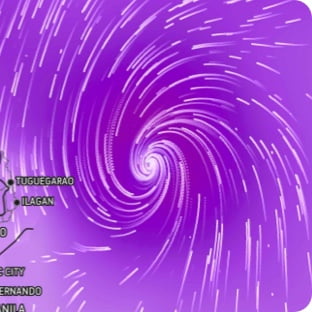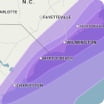
Storm Amy will bring a spell of damaging winds on Friday evening and night What to expect: Roads, bridges and railway lines are likely to close, with delays and cancellations to bus, train, ferry services and flights There is a good chance that power cuts could occur and possibly affect other services, such as mobile phone coverage Damage to buildings and homes is likely, with roofs blown off and power lines brought down There is a good chance that flying debris could result in a danger to life Large waves are likely and beach material is likely to be thrown onto sea fronts, coastal roads and properties Further details: Storm Amy will bring a spell of damaging winds, initially in western areas during Friday evening before gradually transferring northeastwards through the night. During this period, wind gusts of 60-70 mph are likely fairly widely, with 70-80 mph in more exposed areas, and may reach 100 mph in some exposed parts of western Scotland, particularly around Tiree, western Lochaber and Skye for a time this evening. This will lead to dangerous conditions with travel and power disruption. What Should I Do? Windy weather can cause delays and make travel conditions dangerous, consider if you journey is necessary and amend your travel plans if necessary. Bus and train services may be delayed so ensure you check for updates. It is safer not to drive in these conditions, but if you must drive you can do this more safely by taking the following actions: check road conditions before setting out leaving yourself extra time; drive slowly to minimise the impact of wind gusts and be aware of high sided vehicles/caravans especially when overtaking; and, carry essentials in your car (warm clothing, food, water, a blanket, a torch, and in-car phone charger). Don't risk injury to others or damage to your property. Check for loose items outside your home and secure them. Items include; bins, garden furniture, trampolines, tents, sheds, and fences. Being outside in high winds makes you more vulnerable to injury. Stay indoors as much as possible. If you do go out, try not to walk, or shelter close to buildings and trees. People cope better with power cuts when they have prepared for them in advance. It’s easy to do; consider gathering torches and batteries, a mobile phone power pack and other essential items. If you are on the coast, stay safe during stormy weather by being aware of large waves, even from the shore large breaking waves can sweep you off your feet and out to sea. Take care if walking near cliffs; know your route and keep dogs on a lead. In an emergency, call 999 and ask for the Coastguard. Stay up to date with the weather forecast for your area and follow advice from emergency services and local authorities

